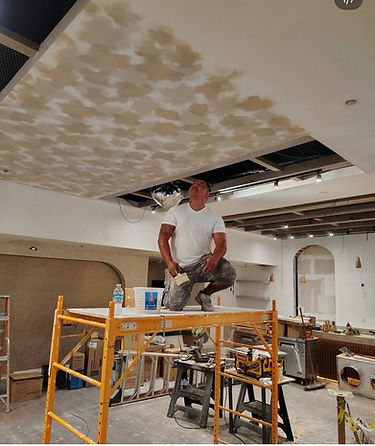
Lime wash
Lime washing is an age-old painting method where a mixture of lime, water, and sometimes natural colors is applied to surfaces, most often to brickwork, stonework, or plaster. This technique has been around for hundreds of years and is still appreciated today because it lasts a long time, allows walls to breathe, and gives a beautiful, soft look.
One of the main reasons limewash is so durable is because the lime chemically bonds with the surface it's applied to, becoming part of the material itself rather than just sitting on top like regular paint. The breathability of limewash means it allows moisture to escape from walls, which helps prevent dampness and damage inside buildings. Aesthetically, limewash provides a unique, slightly textured appearance with subtle color variations that can enhance the character of old and new buildings alike. Because of its natural qualities and attractive finish, limewashing remains a popular choice for those looking to maintain and beautify their properties in a traditional and eco-friendly way.




Here are some key features of limewashing:
Natural Ingredients
Limewash is made from slaked lime (calcium hydroxide), water, and color pigments. It is eco-friendly and non-toxic.
Breathability
Limewash allows moisture to evaporate from the substrate, reducing the risk of mold and mildew. This is especially beneficial for older buildings with porous materials.
Aging and Patina
Over time, limewash develops a natural patina, which can enhance the appearance of the surface, giving it a rustic and aged look.
Color Options
Natural pigments can be added to limewash to create a variety of colors, though the hues may appear softer and more muted compared to synthetic paints.
Application Process
Limewash is typically applied in multiple thin coats rather than a single thick layer. It can be brushed, rolled, or sprayed onto the surface.
Maintenance
Limewashed surfaces may require periodic reapplication, especially in areas exposed to heavy weathering or wear.
Historical Significance
Limewashing has a long history in architecture, particularly in Europe, and is often associated with traditional building techniques.
Benefits of Limewashing
Eco-Friendly
Made from natural materials, limewash is environmentally friendly and contributes to sustainable building practices.
Aesthetic Appeal
It provides a unique, textured finish that can enhance the character of a building.
Durability
When properly applied, limewash can last for many years and withstand various environmental conditions.
Overall, limewashing is an attractive and sustainable option for painting and protecting masonry surfaces, making it popular in both historical restoration and modern applications.
Ready For Excellent Home Remodeling Services?
Contact us today to book an appointment and get a free estimate. Let's create something awesome together!
